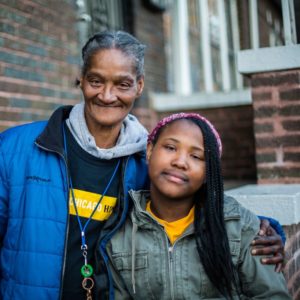For Immediate Release
Amid reports that coronavirus outbreaks have hit Chicago’s homeless shelters, advocates Monday urged city officials to take emergency action to contain a rapidly deteriorating situation.
Published reports indicate that confirmed COVID-19 cases among occupants and staff at the embattled shelters have risen precipitously, with some shelters reporting that up to 45% of their clients have tested positive.
Compared to the city’s population, Chicago shelters serve a disproportionate share of people of color, comprising 82% of shelter residents in 2018.
These alarming infection rates have prompted advocates to recommend that the city immediately identify and prepare additional space where shelter clients who are either COVID-positive or at higher risk of contracting the disease can be safely housed in isolation.
Advocates also recommend awarding hazard pay for the dwindling number of shelter staff who are working, despite personal risk, to keep shelters in operation.
“We commend the many initial steps the city has taken to try to care for people experiencing homelessness,” said Doug Schenkelberg, Executive Director of the Chicago Coalition for the Homeless (CCH). “But we have now seen that congregate settings — from nursing homes and jails to homeless shelters — cater to the spread of this highly contagious virus. Much more must be done to disrupt transmissions in these environments, including for homeless people who live on the street.”
CCH urges the city to adopt the following measures:
- Institute comprehensive testing in all homeless shelters and encampments to identify the most imminent threats of community spread.
- Relocate all shelter and encampment residents who are not infected, but still at higher risk of contracting the disease, into city-administered isolation rooms at local hotels or temporary bridge housing units – severing a potential link in the chain of community spread.
- Create adequate sites for all shelter or encampment residents who test positive for COVID-19 or are symptomatic to access quarantine housing.
- Suspend using criminal background checks to deny admission to quarantine or isolation sites.
- Suspend using medical or behavioral screening criteria to deny access to quarantine or isolation sites. Instead provide adequate support to accept people experiencing homelessness with a range of needs.
- Allocate hazard pay for frontline shelter staff.
- Move people exiting quarantine or isolation housing into permanent housing instead of returning people to homelessness.In addition to the escalating number of infected clients, shelters have reported significant staff shortages in recent weeks. If this continues unchecked, some shelters may be forced to temporarily close down, worsening into a crisis situation.
Last week Chicago Public Health Commissioner Allison Arwady acknowledged that people experiencing homeless are among city residents most endangered by the coronavirus.
“Stopping an outbreak of COVID-19 among Chicago’s homeless population has absolutely been one of the most challenging aspects of this response,” Dr. Arwady said, adding “we have major concern of spread” in the city’s shelters.


